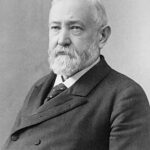The Landmark Decision
President Benjamin Harrison signed the Sherman Antitrust Act on July 2, 1890. This groundbreaking legislation became America’s first federal law targeting monopolistic business practices. Senator John Sherman of Ohio sponsored the bill after growing public outrage against corporate trusts. 📊 The law addressed massive wealth concentration in industries like oil, steel, and railroads.
Congressional Support and Business Opposition
The Sherman Antitrust Act passed with overwhelming bipartisan support in Congress. The Senate approved it 52-1, while the House voted 242-0. Harrison recognized the urgent need to regulate corporate power. Standard Oil and other trusts controlled entire industries, crushing small competitors. ⚠️ These monopolies raised prices and exploited workers without consequence.
Legal Framework Established
The legislation prohibited “every contract, combination, or conspiracy in restraint of trade.” It also banned monopolization attempts in interstate commerce. 💰 Violators faced fines up to $5,000 and potential imprisonment. The law empowered federal courts to issue injunctions against illegal business combinations. Harrison understood this framework would protect American consumers and entrepreneurs for generations.
Impact:
Immediate Economic Consequences
The Sherman Antitrust Act initially faced weak enforcement during Harrison’s presidency. Federal prosecutors lacked resources and experience handling complex antitrust cases. 📉 Early court decisions narrowly interpreted the law’s scope, limiting its effectiveness. However, the legislation established crucial legal precedent for future administrations. Business leaders began modifying their practices to avoid potential prosecution.
Long-term Market Transformation
Later presidents, particularly Theodore Roosevelt, aggressively used Harrison’s antitrust framework. The law enabled landmark cases against Standard Oil, American Tobacco, and Northern Securities. 🔥 These prosecutions broke up massive monopolies and restored competitive markets. Small businesses gained opportunities previously blocked by corporate giants. Competition increased innovation and reduced consumer prices across multiple industries.
Constitutional and Historical Legacy
The Sherman Antitrust Act demonstrated federal government authority over interstate commerce. It proved Washington could effectively regulate powerful corporate interests when necessary. 🌍 The law influenced antitrust legislation worldwide, inspiring similar regulations in Europe and elsewhere. Modern antitrust enforcement still relies on Sherman Act principles. Harrison’s signature created the foundation for today’s competitive American economy, protecting millions of consumers and entrepreneurs from monopolistic abuse.
